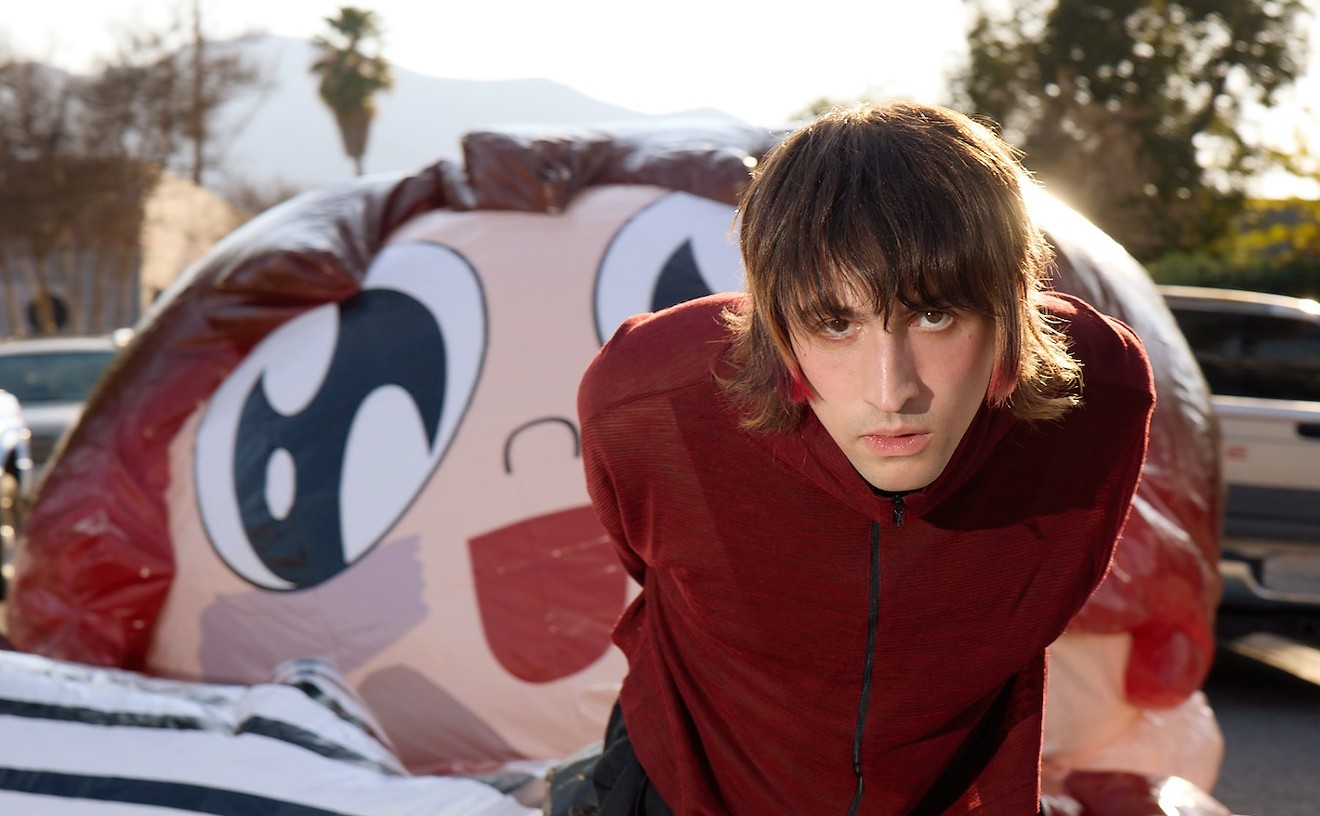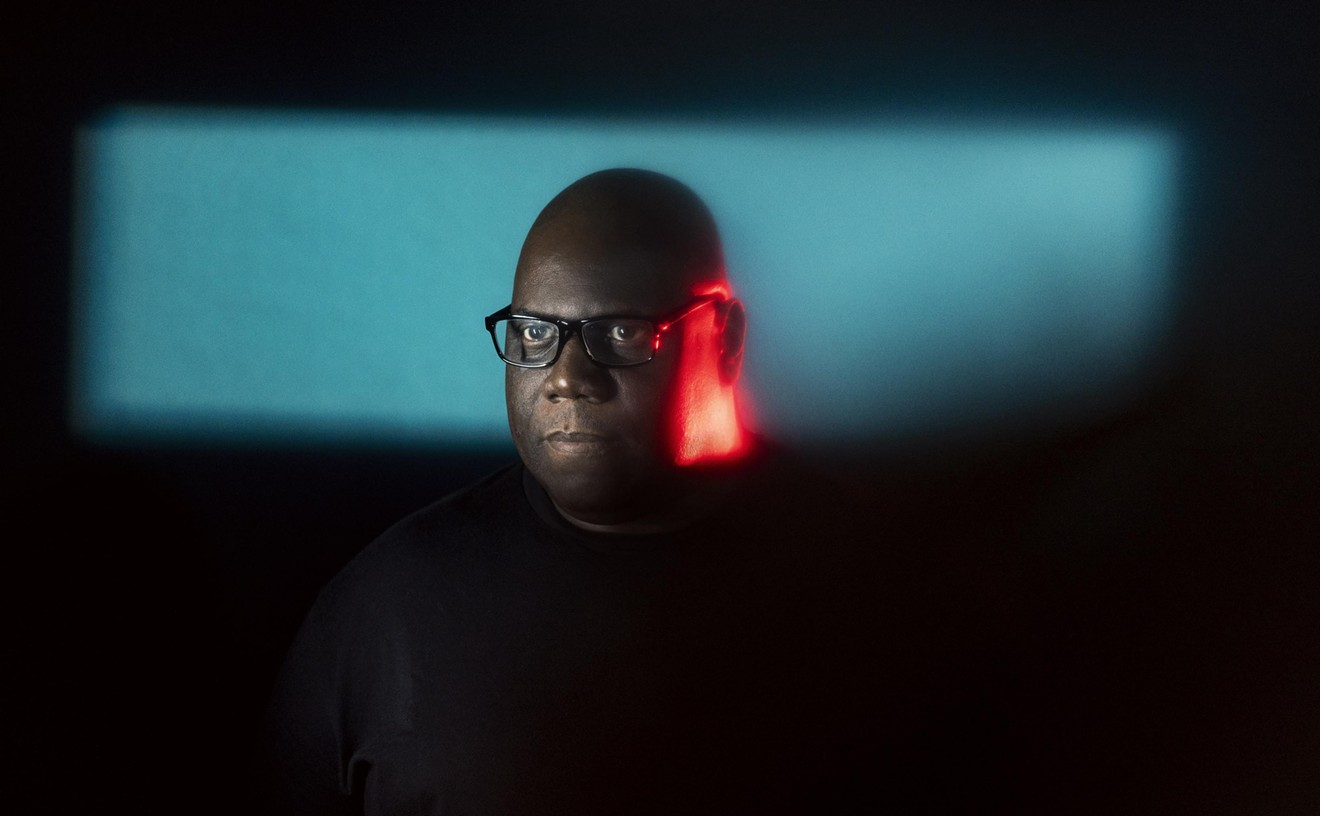You can see it at Privilege, which was so empty on a recent Friday night that the raucous breakbeat sounds of Habersham and Dave Preston, together known as Dirtydoodoofunk, seemed to echo throughout the mostly empty main room. And you can hear it in the animated presence of Amália Leandro www.amalial.com , a.k.a. Amália L.
"When I first came to live in Miami, one of the first things my friend Mark Vane told me was, 'Just remember, it's not like it is during conference.' It's hard," she says. "But there's a lot of support for house and electronic music here. It's still the best club scene to go to in North America."
On first impression, Amália appears to be your typical South Beach dilettante. An intensely attractive woman, she dabbled in modeling and acting before turning her attention to spinning and songwriting in 1999. She was featured in the July 2001 issue of Vibe magazine, and she spins tech-house during Sidetracked Tuesdays at Blue, Sunday afternoons at Privilege, and Sunday evenings at Cafeteria. At one point during a conversation at the South Beach café Segafredo Espresso, she casually adds that she has taken up painting and her canvases can be viewed at Blue.
Beneath Amália's cultured, refined exterior, however, lies a sharp intellect that isn't afraid to dress down reporters who ask stupid questions. Plus, the woman's got issues. She recently broke up with her musical and romantic partner, DJ Cue, which forced her to move into another apartment on South Beach.
Many in the local music scene associate her with Cue, since he was instrumental in helping her procure gigs, including the longstanding residency at Blue. It made her vulnerable to being cast as Cue's girlfriend instead of his equal partner. "I feel like I didn't have my own identity," she says. "He taught me a lot, but he definitely didn't teach me everything, and I even taught him a thing or two."
Most of all, there's a yearning in her voice. She wants to establish herself as a painter; she wants to be known as a lyricist; she wants to get better DJ gigs. She tells me she has written a track with Cue, "What You Do," that is scheduled to appear on a compilation by British house label Defected sometime this month. During WMC, Amália spun at several parties, including a showcase with Chicago's famed Superjane crew at Blue on March 10.
But the eleven and three-quarter months prior to WMC can be a desert full of bullshit: meaningless "events" thrown by egomaniacal promoters, frivolous fashion shows, and idiotic "parties" hosted by B-list stars who get paid thousands of dollars to drink Cristal behind a roped-off VIP area for voyeurs. As for the artists, the people whose interests lie beyond the gossip pages of Ocean Drive magazine, they're often concealed behind the DJ booths in environments meant to highlight the conversations between smutty-minded jerks and their silicone-chested companions, not the music.
As frustrating as South Beach can be, though, there are people who want to see the city as a potential music town instead of a red light district. They log onto message boards such as cooljunkie.com and clubplanet.com, excitedly talking up the latest hot spots. They support midsized venues such as Nerve, Privilege, and Blue, bypassing superclubs such as crobar and Mansion. They make up the Beach's hidden bohemian subculture.
"Miami's all about the bottle service, the models, and the celebrities," says Amália. "But then there's a big, strong scene that wants to hang out on Space's patio in the morning and get dirty; or go to Privilege in the after hours, and then maybe go to Nerve at night. There's definitely an underground scene. That's where my focus is. That's the Miami that I know."
The following Sunday, Amália lounges inside the DJ booth at Nerve, www.nervelounge.com coolly watching the Dolce & Gabbana-spectacled owls slowly trickle into the club. With little advance warning, she glides over to the turntables and launches into a brief, scorching set of tech-house, banging out tracks that pulse and crackle with dark, near-tribal energy.
Forty-five minutes later, as the clock approaches midnight, the rapidly growing crowds have their drinks in hand and are ready to dance. Unfortunately Stephan Luke has just arrived, and is preparing to take over the decks. "I hate having to spin early," she says ruefully. She is so fed up, in fact, that by the next Sunday she has taken up her weekly gig at Cafeteria spinning records for the after-dinner crowd.
Two days after Amália's finale, three of Nerve's principals -- DJ/producer/co-owner Jon Cowan, marketing director Samantha Stormo, and general manager Michael "Frenchie" Bourdeau -- gather to talk about its upcoming events. The club has partnered with the Columbus, Ohio booking agency Mythodic Promote Group for a new Friday-night party, Ritual, that has already featured Sandra Collins, among others. In addition, it is working with Chicago's X'ess Entertainment on a Saturday-night party set to premiere in May with house legend Frankie Knuckles.
"We've always brought high-profile DJs from the beginning," says Cowan, adding that past guests include superstar jocks such as John Digweed and Roger Sanchez. "[Mythodic] gives us buying power, basically. With them having five, six different venues around the country, instead of just booking [a DJ] for one date, you can book the artist for five dates. You can get a higher DJ at a lower cost ... it gives us more leverage."
Nerve is building an impressive schedule of guest DJs, but that doesn't mean people will go there. A recent night hosted by Aquabooty with New York DJ Neil Aline brought out an enthusiastic but modest group of fans; in contrast, an appearance by Layo and Bushwacka several months ago packed the club.
It's the South Beach Coyotes that really bring out the crowd. Every Tuesday the same scene is played out from the craptastic Coyote Ugly flick (albeit with better-looking women). Ladies in jeans and hot pants prowl the bar top, pouring shots into panting men's mouths, then move toward the pole in the middle of the dance floor, twisting and writhing to a pop-heavy soundtrack that's equal parts Digital Underground and White Stripes amid shiny crystal balls and oscillating laser lights.
It's the last place you'd expect to meet Stephany Lobban, better known as DJ Dakota www.djdakota.com Lobban isn't here to dance; in fact she makes it clear that, unlike Nikki Beach's DJ Snezana or Pearl Champagne Lounge's She*DjHana, she's doesn't wear skimpy or provocative clothing when she spins records. "Some of them definitely go for the sex appeal," she says later during a phone interview, clarifying that she is extremely supportive of other local female DJs. But, she says, "That's not my approach as a female DJ."
So why would Dakota, a breaks and house advocate who is set to star on Women's Entertainment TV network's summer series Single in South Beach, put up with this glorified beer-and-babes fest? "It's not solely the music that's going to make the club," she reasons. "It has to have atmosphere."
Earlier, Nerve's Frenchie had echoed her thoughts. "You've gotta have the visuals in the form of a light show, the girls up on the bar dancing ... videos that are played up against the walls, changing the décor of the club," he explained. "There are all types of things that go into stimulating the people. They're not just coming for music."
To be fair, everyone in the nightlife world -- from music-friendly venues that offset riskier electronic and house events with money-making burlesque shows, to DJs who'll toss a cheesy Madonna dance remix into their mostly instrumental sets -- has to balance integrity with the realities of the business.
Marco Davalos and his girlfriend, Carla Orellana, run the promotions company P:M Sessions www.pmsessions.com The duo host a party at Privilege on Fridays that highlights up-and-coming house, breaks, and techno DJs; then rebroadcast DJ sets from that night on www.protonradio.com at 9:00 p.m. on Tuesdays. Despite those accomplishments, says Davalos, he notes that his venture doesn't make a lot of money. "That was one of our slowest nights ever," he says of the Dirtydoodoofunk show several weekends ago.
"We've had nights that are really busy," notes Davalos. "But I'm more concerned about building that base as broad as possible, because that will keep the party going in the long run." He wants to teach the city how DJ culture -- good tunes, dancing, having fun -- can be more interactive and dynamic than gawking at celebrities in an overpriced lounge.
There is considerable evidence that South Beach's dance climate is improving. There are a variety of places to go, from Nerve and Privilege to Jade (Tempo Saturdays) and Lounge 16 (Broken Beat every second Friday). But are there enough fans to go around and, more important, help the scene grow?










